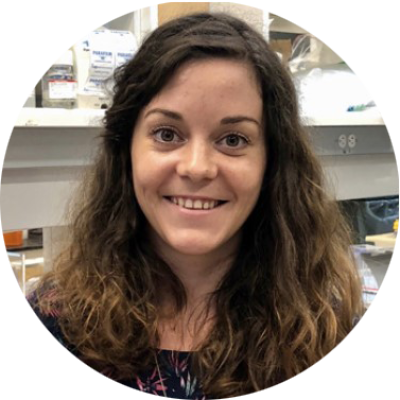
Eloïse M. Grasset
One research interest of the Ewald lab is to understand how cancer cells are able to travel within the body to form distant metastasis. For my research, I focused on triple negative breast cancer [TNBC], an aggressive subtype of breast cancer typically associated with metastasis and worse patient outcomes. Patients with TNBC tumors express mesenchymal markers often associated with the epithelial to mesenchymal transition [EMT]. However, the role of EMT during spontaneous TNBC metastasis in vivo remains incompletely understood, and the clinical relevance of EMT in patients with TNBC is unclear. Using a combination of in vivo and ex vivo organoid assays, I demonstrated that EMT is required for TNBC metastasis formation. Importantly, my research highlighted the complexity of cancer cells’ states within TNBC metastases and revealed that the majority of TNBC metastases maintain some mesenchymal features. These results suggest that TNBC will be an important context in which to evaluate anti-EMT therapeutic strategies. Indeed, targeting cancer cells expressing mesenchymal markers would potentially inhibit both invasion and metastases development.
Questions & Answers
Why did you choose Johns Hopkins for your work? Even though Johns Hopkins is a world-renowned research institute, my decision was based on Dr. Andrew Ewald’s research. I remembered presenting journal clubs on his publications during my Ph.D. training. Therefore, I was excited to apply to his lab when I was looking for a postdoc. It is only after a couple of months at Johns Hopkins that I realized how lucky I am to be able to study in such a great environment. What does receiving this award mean to you personally and professionally? Do you have any connection with the particular award you received? I am very honored and humbled to receive the Daniel Nathans Research Award. Personally, this award gives me the confidence to continue tackling the challenging problems in cancer biology. Research can sometimes be difficult for trainees, with the fear to fail or not be good enough in this very competitive domain. This award is a recognition of all the perseverance and hard work that was needed to accomplish this project. Interestingly, my project would not be possible without Dr. Daniel Nathans’ work on the SV40 virus. I used a mouse model, for my research, that developed breast cancer due to the expression of the large T antigen of the SV40 virus, discovered by Daniel Nathans using restriction enzymes. What contributed to your project’s success? (Special skills, interests, opportunities, guidance, etc.) I have been incredibly fortunate to have Dr. Ewald as an adviser. He has given me the intellectual freedom to pursue the questions and ideas that I find most interesting and, most importantly, he has always been supportive. Moreover, research is a teamwork. I don’t think this project would have been possible without the numerous discussions with the current and past Ewald lab members. I would also like to thank our great collaborators at Hopkins: Dr. Elana Fertig and her lab members for their work and help on the single cell RNA sequencing. Finally, this project would not be a success without the unconditional support from my husband, Simon, and my family. What thoughts do you have about Young Investigators’ Day itself, as a celebration of the roles students and fellows play in research at Hopkins? Although research is fascinating, it is also often related to doubts and fear about our future. Most students and postdocs persevere through failed experiments and long hours. Celebrating students and fellows is important to recognize all the work the trainees are doing every day. Research would not be possible without students and fellows, and it is great that Hopkins has created a venue to recognize their achievements. What has been your best/most memorable experience while at Hopkins? I have had an amazing time in the Ewald lab and at Johns Hopkins. It is hard to pick just one moment. Overall, I think it’s been the fantastic scientific and nonscientific discussions with the Ewald lab members and trainees at Hopkins. I learned so much about science but also diversity and inclusion. Hopkins is a great place that brings together people from different origins and countries. I feel that we sometimes traveled during our lunch break with our discussions. This international environment is for me one of the best experiences while at Hopkins. What are your plans over the next year or so? Graduating, looking for faculty positions, etc.? Next year, I am excited to join the Center for Research in Cancerology and Immunology Nantes-Angers in France to start my research group. Tell me something interesting about yourself that makes you unique. Do you have any special hobbies, interests or life experiences? I come from a large family — I have one brother and four sisters. Interestingly, we all have completely different careers, and I am the only one in science. I love that science allows me to combine both my passion for research and traveling. So far, my research studies led me to live in the U.K., Madagascar and the U.S., which all have been incredible experiences, both professionally and personally.